








Travel report September 2007 (Nepal)by Stefanie ChristmannIn August/September 2007, Stefanie Christmann, the chairwoman of Esel-Initiative travelled to Upper and Lower Mustang (Annapurna region). Carbon emissions from her flight were offset by a donation to www.atmosfair.de. As always, her flight and all other expenses were financed privately. To ensure that selection of mothers and allocation of animals is done according to our criteria, I first set out to trek through a larger project area with Susanne von der Heide (HimalAsia) and Laxmi Gauchan (founder and chairwoman of the Nepalese NGO Sahayog Himalaya-Nepal, assigned by HimalAsia). At the allocation interviews in the villages we soon realised that a direct and exclusive co-operation between esel-Initiative and Sahayog Himalaya-Nepal makes more sense. This was approved by Susanne von der Heide as well as the managing committee of Esel-Initiative and a co-operation agreement directly with Sahayog Himalaya-Nepal has been concluded. The poverty experienced by single mothers in Mustang, not only in remote villages but also along the trekking paths, is devastating - even in summer. In the winter, temperatures in Upper Mustang drop to -30°C to -35 °C for several months. Apart from some widows, none of the single mothers owned a home or an animal. In the north of Upper Mustang, a number of single mothers are living in rock caves. Only a very few single mothers had at least a small piece of land. These women must earn their income (about 1 EUR per day) as day-labourers. During the few months of farm work, they work on other people's fields carrying the harvest for them on their own backs. In the remaining months, they carry stones to building sites and build walls around the fields of land owners. During winter, they cut and sell wood. Many single mothers cannot afford to send their daughters to school. First donkey allocations The trading men own mules, which are all imported from India and which are sterile. Traditionally, women and girls carry all weights on their backs. Tibetan freedom fighters introduced the first donkeys to Mustang after 1959, but their number remains low. Women do not own any of them. Mustang donkeys - similar to yaks - have relatively short legs and are fairly sturdy animals. They can carry - quite obviously without any problems - 50 kg sacks for days to market towns. However, mules are stronger. Thus, in the foreseeable future donkeys could die out in this region due to lack of demand before they could be used to help these women. Sahayog Himalaya-Nepal is now starting to allocate female donkeys in the north of Upper Mustang. Donkeys are more than sufficient for the weights the women carry and the distances they need to cover and they need less food than mules. That makes them ideal for single mothers. Once the women recognise the benefits of the donkeys and start to breed them, we will donate more donkeys in later years. Milk and eggs provide income At the moment, we mostly allocate cows in Mustang. The price of milk is high and provides a good income, even to single mothers who only sell milk to neighbouring households. Decisive factors in the choice of cow species are the fodder situation in situ, altitude, winter temperatures and milk yield. Women who have no space for the animal in their home will receive a piece of land from the village to provide room for the animal and a stable. Fodder can be harvested from around the village. Cow prices range between 100 and above 300 EUR depending on the region. In a few villages on the border between Lower and Upper Mustang, there is not enough fodder for cows to produce sufficient milk. For the time being, we will allocate 19 chickens and one rooster there as eggs can also provide a good income. In Kagbeni, another village in this region, a very productive grass which is much valued by the cows has been growing for eight years. Pema D. got the seeds from an ecologically similar Himalaya region and is now distributing seeds free of charge to these villages so that the cow project can also start there in a couple of years. Women should be proud We want these single mothers to be proud of themselves and their achievements and not have to say "thank you" to Europeans all the time. Imagine you had received a home owner's allowance and totally strange tax payers would arrive at your door to inspect your house - you would not like that either. Yet, even for Eritrea I get at least two requests every week from people who want to accompany me or travel there alone to meet donkey owners. We refuse these requests. Our contributors almost always understand and respect our reasons why but some are quite adamant. In order to protect single mothers from interested or just curious trekkers in the tourist regions of Nepal, we will not provide full names of single mothers in our travel reports and hope for your understanding. Allocation of cows The widow Lal K. is the poorest woman in Thini (Lower Mustang). She is a day-labourer and must pay the rent for her small house in Rupees. Neighbours help to raise the school fees for all of her five children. To be able to buy exercise books, she sells some of the produce from her vegetable garden which is in fact meant to feed her family. The cow will provide her with an additional daily income of about four day's day-labour. Twenty-two year old Raj K. from Lete (Lower Mustang) was deserted by the father of her child and is now looking after her three year old son on her own. At the moment, she is living in her parent's house. But her brother will inherit it. Her goal is to have her own home when her brother gets married. Raj K. has already built a stable for her cow and put down soft padding for the birth of the calf. She intends to sell the milk and will definitely keep a female calf. The cow owned by Bim K., a 65 year old grandmother from Lete, has already had its calf. Bim K. is a most impressive woman. When her husband died she was unable to survive in her remote village. With 300 Rupees (3.50 EUR) in her pockets, she travelled to Lete and built a hut there for herself and her daughter. Since her daughter's death she is looking after her two small grandchildren. She cooks for porters and mule trek herders. Recently, she started selling cups of hot milk. This way she earns a lot more per litre than from selling milk in the neighbourhood. She tells us that her hut has to be repaired all the time but now that she is getting old, the additional income from the cow will be of great help. Polyandry is common In Upper Mustang and especially in the remote regions, polyandry is common. To prevent distribution of the land after the death of the parents, the younger brothers are also married to the wife of the eldest son. So inevitably, there are many single women in regions with polyandry. For single women to have one or more children is not seen as something wrong. But these women have no possessions and are forced to take on very hard work. Those who live in a town such as Lo Mantang (population 1200) are lucky as there are other opportunities to earn money apart from field work. And those who can live in their parent's/brother's house of with their employer are equally lucky. But for single mothers who have to pay rent, life is very hard. hard labour to pay the rent As a child and after she got married, 23 year old Diki G. travelled with yaks across the high meadows. After the death of her husband, she moved with her two year old child to Lo Mantang. She has no relatives there, but Lo Mantang has a school. In lieu of rent for her room she has to work for the house owner ten days of hard labour every month. On the other days, she sells tea and soon also hot milk and she cooks for the school. 31 year old Duki G. (Lo Mantang) must work even 15 days a month for her rent. On other days, this mother of a one year old daughter cooks for others. With their cows, these women will have an additional source of income also on the days when they have to work for their rents. Living in rock caves For single mothers in small villages life is much harder. The more remote a village, the farther away from Buddhist monasteries, the more common is polyandry. The population of Chössar (half a day walk north east from Lo Mantang) is a good 700 people. Of these, 25 are single mothers with small children. They own virtually nothing and will now receive a cow each. Several of these women live in rock caves because that way they do not have to work in lieu of rent. Thirty-five year old Dossilamo G. lives with her three small children in a rock cave. She has expanded the cave to some extent and even created a vegetable garden. The cave of this young woman is luxurious compared to the tiny caves filled with smoke from the cooking pits where the old women live. Pömba L. is between 50 and 60 years old and has no longer got the energy to expand her rock hole or to work hard for others. This landless woman has always lived here. After the death of her daughter she now also has to take care of her eight year old granddaughter who is going to school. Coming from prosperous Europe, it was humiliating to face this grandmother in her hole of a cave with its sooty walls and to see the tears in her eyes when she found out that she will get a cow. Midwives get horses In Upper Mustang, only half of the children live to the age of five. At every tenth birth, the mother dies. Midwives and female amchis (doctors of traditional Tibetan medicine) trained in obstetrics must become more mobile. This is only possible with horses and a horse costs about 650 EUR. This is a lot more expensive than the "midwife taxis" in Eritrea, but these horses can save women from an agonising death. I consider safe birth as the first human right of a newborn and his/her mother. I definitely want to continue allocation of these midwife taxis. We have already given a horse to the well trained midwife of Samar (3660m). She is responsible for a number of villages located several hours journey apart. When a difficult birth is expected Dolka G. transports women by horse to the health centre in Chuksang (2980m). To get there she has to negotiate several times over 700 m in height on steep slopes and even has to cross the Kali Ghandaki River. We have promised to allocate horses to three trained amchis, deployed in the mountains north of Lo Mantang. Twenty-three year old Rinzin W. is stationed in the Chössar region, 22 year old Pema D. in the catchment area of the Kimling River and 22 year old Rinzin W.G. in the Chonop region (located even for women who are not pregnant a day's ride away from Lo Mantang). With their horses they will transport as many mothers as possible to the amchi clinic in Lo Mantang a few days before their due date. The other births they attend to at the mother's home. They also use their horses to collect medicinal herbs in the mountains. |
Other travel reports:
August 2011
September 2010
February 2009
September 2008
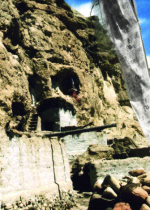
Single mothers still live in rock caves such as these.
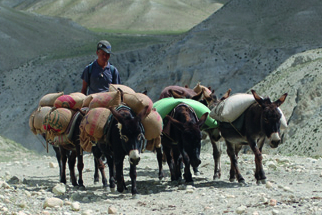
The Mustang donkeys will soon carry gras, food and wood for single mothers.
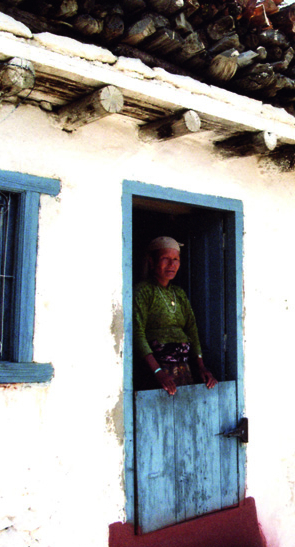
Lal K. has five children and pays her rent in Rupies.
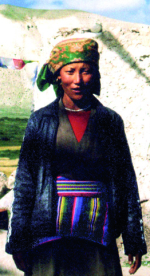
Bim K. has already got her cow. The 65 years old takes care of her two grand children.
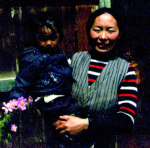
Duki G. with her little daughter.

Dossilamo G. is cultivating vegetables in front of her cave.
home | the project | news | on tour | on site | ideas | partners | the board | help | mail
Account No. 106 57575 - Sparkasse KölnBonn - BLZ 370 501 98
For donations from outside Germany - IBAN: DE02 3705 0198 0010 6575 75 - Swift-BIC: COLSDE33
please only bank transfers in Euro, no checks!